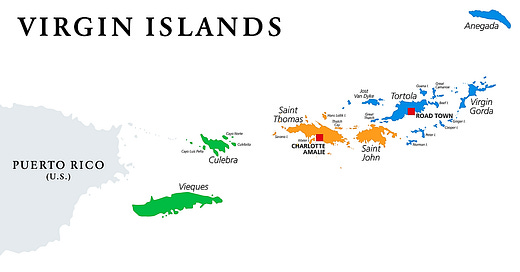British Virgin Islands to vote on same-sex marriage
Ghana Supreme Court gives green light to anti-LGBT bill
The British Virgin Islands has gazetted its proposed referendum questions about same-sex marriage and civil unions. They are:
“Are you in favour of same-sex marriage being legalised in the Virgin Islands?” and
“Are you in favour of legislation which would provide for civil unions or domestic partnership in the Virgin Islands, which would allow same-sex couples to have rights, privileges and benefits, including but not limited to property rights, health and medical benefits, employment and social security survivors’ benefits?”
The BVI government is trying to pre-empt a court case seeking equal marriage rights and to get a fig leaf for its established legal obligation to provide civil unions with this referendum. In fact, the territory’s Premier has openly acknowledged the government’s legal obligation to provide civil unions (which stems from the European Convention on Human Rights, which it is party to through the UK), which demands the question — so why are you even asking?
It’s unclear how Islanders think about either question, but it’s unlikely that the usual anti-LGBT crowds will campaign for anything but “no” to both questions. BVI has never held a referendum before, so it’s also unclear what sort of interest and participation is likely. Bermuda tried this trick in 2016, and ended up with “no” on both questions, only for the court to rule for marriage, the government to try to overrule the court by passing the Domestic Partnership Act, the court to rule for marriage again, and then the Privy Council to strike down marriage, and now the question is back at the European Court of Human Rights.
No date has been set for the vote yet.
Ghana’s Supreme Court has dismissed an appeal to stop Parliament from passing the “Human Sexual Rights and Ghanaian Family Values” bill, an escalation of the country’s anti-LGBT laws. The bill would criminalize simply being LGBT, as well as any advocacy for LGBT rights or publishing content considered pro-LGBT. The bill also sanctions conversion therapy, which could be used to reduce sentences if convicted persons agree to undergo it.
In Ohio, a bipartisan bill to ban “conversion therapy” on minors has been introduced and assigned to a state house committee. Another bipartisan bill was introduced last month to ban anti-LGBT discrimination, but it is still awaiting a committee assignment. Despite the bipartisan sponsors of these bills, neither is likely to get anywhere, given the Republican control of the state, and the fact the state recently passed a number of anti-trans bills and is considering a harsh anti-drag performance bill ala Florida. There’s also an effort afoot to repeal Ohio’s harsh HIV-criminalization laws, but it is unlikely to go anywhere until Ohio votes Democrat.




